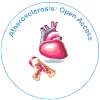Role of Antioxidants in Protecting Arteries from Atherosclerosis
Received: 09-Jul-2021 / Accepted Date: 23-Jul-2021 / Published Date: 30-Jul-2021 DOI: 10.4172/asoa.1000157
Keywords: Antioxidants, Arteries, Atherosclerosis
About the Study
Atherosclerosis is the main leading cause of deaths in most of the developed and developing countries. Changing in lifestyle, dietary habitats are the main potential cause of cardiovascular diseases. Many studies focused to develop the new models and therapeutic theories in preventing cardiac failures. This study, describes a role of antioxidants in preventing atherosclerosis.
Higher intake of food containing carotenoids, vitamin C, and α-tocopherol and/or blood concentration levels were associated with reduced risk of Cardio-Vascular Disease (CVD), total cancer, and all-cause mortality [1]. Antioxidants are the hub of many fruits and vegetables, consumption of these sources in the diet decrease the risk of chronic diseases. The chemical present in the food reduces the oxidized elements which are produced during metabolic pathways. Flavonoids are the ideal components, since they are plentiful in foods containing antioxidant vitamins (fruits and vegetables) and are potent antioxidants. Compounds rich in flavonoids, seem to have beneficial effects on multiple mechanisms involved in atherosclerosis [2].
Mechanism of antioxidants
Natural and synthetic antioxidants facilitate atherosclerosis treatment through different mechanisms, including
• Inhibitions of LDL oxidation-PUFAs present in the LDL are oxidized to lipid hydroperoxides, which are only intermediates. These intermediates will decompose to aldehydic products, accompanied by several additional changes in the LDL.
• Inhibits cytokine secretions in human coronary artery endothelial cells.
• Prevention of atherosclerotic plaque formation and platelet aggregation.
• Improvement of endothelial dysfunction and vasodilation’s.
• Promotion of NO bioavailability for dilation of blood vessels.
• Suppresses foam cell formation.
• Prevention of mononuclear cell infiltration.
• Antioxidants reduce the generated Reactive Oxygen Species (ROS) in the cell [3].
Low Density Lipoprotein (LDL) oxidative modification in the vascular wall seems to be a primary factor in atherosclerosis development. Through a receptor-mediated intake macrophages combines with oxidized LDLs and transform into a foam cells. Oxidized LDLs show cytotoxic potential which is responsible for endothelial cell damage and macrophage degeneration in the atherosclerotic human plaque. Large number of epidemiological, clinical and experimental studies has been proven that the role of natural antioxidants, i.e. Vitamin C, dietary antioxidants, Vitamin E and carotenoids may reduce atherosclerosis progression. It has been suggested that natural antioxidants may be effective mostly in selected subgroups of patients with high levels of oxidative stress.
According to the free radical theory of aging, antioxidants were considered as a protective and beneficial effect against the cell death. Antioxidants are substances that neutralize ROS before they are able to react with cellular components and alter their function or structure. The functional property of all the antioxidants are same, the chemically reduces the free radicals and neutralize them before entering into the cell. Dietary antioxidants are highly lipophilic with long alkyl chains (e.g. vitamin E, carotenoids), while others are highly water-soluble (e.g. vitamin C). This chemical diversity impacts heavily on bioavailability, metabolism, and cellular distribution of any given antioxidant; lipophilicity will predispose to accumulation in cell membranes and circulating lipoproteins, while water-soluble agents are readily penetrate into the cell membranes without the aid of transporters. Bioavailability is a highly complex issue that depends on resistance to digestion and metabolic conversion by the gut microbiome absorption, metabolism, and clearance [4].
Conclusion
Diet rich in antioxidants protect the heart from several diseases. Many epidemiological studies and others focused on the protective effect of antioxidants against atherosclerosis. There are several open new ways to understand and develop new therapeutic pathways in the fight not only against atherosclerosis but also against other degenerative diseases. A plate with colorful menu makes the heart healthier.
References
- Ciccone MM, Cortese F, Gesualdo M, Carbonara S, Zito A, et al. (2013) Dietary intake of carotenoids and their antioxidant and anti-inflammatory effects in cardiovascular care. Mediators Inflamm 2013: 782137.
- Grassi D, Desideri G, Ferri C (2010) Flavonoids: Antioxidants againstnatherosclerosis. Nutrients 2: 889-902.
- Varindra P, Sekhon BS (2006) Reactive oxygen species and antioxidants innplants: An overview. J plant Biochem Biotechnol 15(2): 71-78.
- Thomas W (2004) Absorption and metabolism of flavonoids. Free Radic Biol Med 36: 829-837.
Citation: Chiara R (2021) Role of Antioxidants in Protecting Arteries from Atherosclerosis. Atheroscler Open Access. 6:157. DOI: 10.4172/asoa.1000157
Copyright: © 2021 Chiara R. This is an open-access article distributed under the terms of the Creative Commons Attribution License, which permits unrestricted use, distribution, and reproduction in any medium, provided the original author and source are credited.
Select your language of interest to view the total content in your interested language
Share This Article
Open Access Journals
Article Tools
Article Usage
- Total views: 2383
- [From(publication date): 0-2021 - Dec 10, 2025]
- Breakdown by view type
- HTML page views: 1669
- PDF downloads: 714
